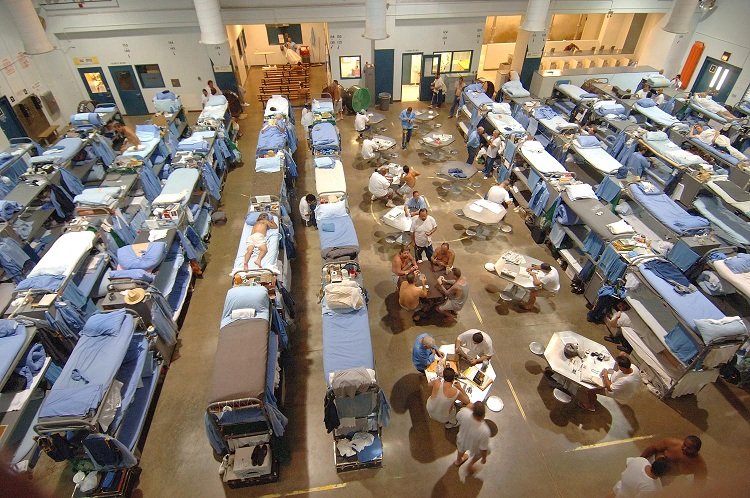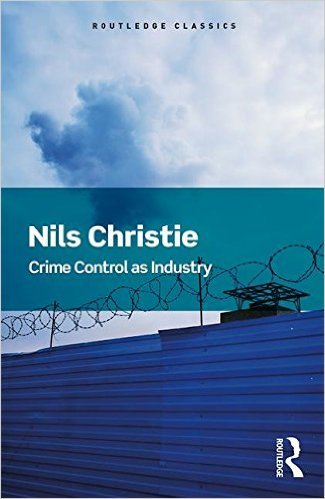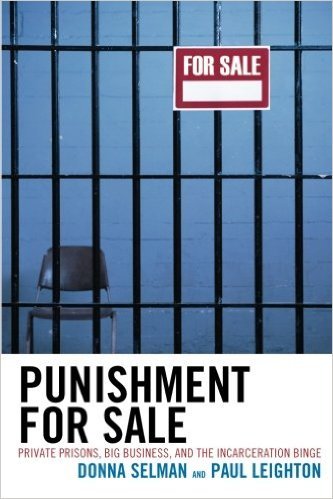
Given recent posts about the failures of public-policing, I sat down with the intent of writing something that would raise doubts about privatization of certain aspects of the criminal-justice system, using privatized prisons as the basis. Over the years I had read various articles, seen in-depth pieces produced for television, and read a book or two on the subject - I had already reached my conclusions - I thought this would be an easy target. Prior to researching the subject for this post, my perspective was that private-public partnerships were fundamentally corrupt, and that profits were being squeezed out at the expense of the people that these relationships between the state and private enterprise, are supposed to serve. Well .. I hold on to part of that belief, but of the other I am no longer that certain.

In the case of prisons, the beneficiaries are supposed to be primarily the taxpayer/citizen who is paying to have people who are a danger to them, locked up for whatever period of time has been judged appropriate. Secondarily, the inmates themselves are supposed to benefit - citizens who have had their rights suspended by the state, and in return are expected to rehabilitate themselves, and participate in the process of rehabilitation as set out by the prison management, with the ultimate objective of rejoining society as a productive and law-abiding member.
Another commonly held misconception is that this is solely a United States-based phenomenon - in the United Kingdom "there are now 14 privately run prisons in England and Wales and two in Scotland, accommodating about 15% of the UK prison population." (source: Wikipedia: Private Prison), also in Australia it is a booming business. Surprisingly, my country of Canada had dabbled with it, but there are no current entirely privately run institutions. Israel had ventured into this territory, but eventually their Supreme Court ruled them unconstitutional in 2009. For certain private prisons, and immigration reman centers are far from seen as "experimental" - this is well-established, highly-influential big business watching over of a large percentage of the planet's prison population.
After catching up on the current state of private prisons, my pre-existing notions have been very much challenged. Mind you there are problems with these public-private "arrangements", as in the case of the 2008 "Kids for Cash" scandal, where the builder / operator of two private youth detention facilities was paying kickbacks to judges in order that children spend extended periods for very minor offenses. There are other cases where the benefits to state and legal officials are not as overt, and adult sentences are maximized so that the prison gains more from additional billing to the state - in return, the private organization makes large campaign donations.
Last week, Clinton and other candidates revealed a number of lobbyists who are serving as “bundlers” for their campaigns. Bundlers collect contributions on behalf of a campaign, and are often rewarded with special favors, such as access to the candidate.Richard Sullivan, of the lobbying firm Capitol Counsel, is a bundler for the Clinton campaign, bringing in $44,859 in contributions in a few short months. Sullivan is also a registered lobbyist for the Geo Group, a company that operates a number of jails, including immigrant detention centers, for profit.
As we reported yesterday, fully five Clinton bundlers work for the lobbying and law firm Akin Gump Strauss Hauer & Feld. Corrections Corporation of America, the largest private prison company in America, paid Akin Gump $240,000 in lobbying fees last year. The firm also serves as a law firm for the prison giant, representing the company in court.
Duopoloy - 2 Companies Own 75% of the World Market

http://www.cca.com/

http://www.geogroup.com/
Additional Criticisms
Besides overt anecdotal cases of government / judicial system corruption, when individuals receive direct-benefit by actively assisting with the bottom-line of these very large corporations at the expense of the rights of individuals, we have a more systemic issue, where 3rd-party corporations benefit from the cheap labor provided by these prisons.
At least 37 states have legalized the contracting of prison labor by private corporations that mount their operations inside state prisons. The list of such companies contains the cream of U.S. corporate society: IBM, Boeing, Motorola, Microsoft, AT&T, Wireless, Texas Instrument, Dell, Compaq, Honeywell, Hewlett-Packard, Nortel, Lucent Technologies, 3Com, Intel, Northern Telecom, TWA, Nordstrom’s, Revlon, Macy’s, Pierre Cardin, Target Stores, and many more .. Source [.. also ..Starbucks, Victoria's Secret, McDonalds ..]
In order for the prison system to be able to provide this workforce, individuals are suffering extended stays in prison for non-violent / victimless crimes, and many awaiting their day-in-court - many of these individuals, forced to participate in a modern form of slavery, are in-fact innocent of the crimes they are accused. It is well-known that many people that enter the prison system are mentally-ill, and if there was any means for them to receive treatment for their ailments would never have had the negative interaction with law enforcement which led to their incarceration.
Ninety-seven percent of 125,000 federal inmates have been convicted of non-violent crimes. It is believed that more than half of the 623,000 inmates in municipal or county jails are innocent of the crimes they are accused of. Of these, the majority are awaiting trial. Two-thirds of the one million state prisoners have committed non-violent offenses. Sixteen percent of the country’s 2 million prisoners suffer from mental illness. Source
Lobbying Efforts by Both Public Prison Unions & Private Prisons
Of the many undeniable criticisms the one that most people are concerned with, are unjustifiable sentences for crimes that many believe should not be crimes at all! Victimless crime, causing very-little social harm - primarily marijuana-related "offenses". Public Prison Guard Unions across the United States, and of course the Private Prison Industry, lobby the government tirelessly to not only maintain current the current criminalization of marijuana users, but to increase the severity of sentencing.
Corrections Corporation of America, the largest for-profit prison company in America, spends nearly $1 million a year against cannabis legalization. This is their official reason why: "changes with respect to drugs and controlled substances ... could affect the number of persons arrested, convicted, and sentenced, thereby potentially reducing demand for the correctional facilities to house them. Source: Misde-Memer - Snopes.com
Determining Success - Cost-Savings Can Not Be the Only Measure
According to Reason.org Policy Study No. 240 - Private Prisons: Quality Corrections at a Lower Cost there is a degree of success to be mentioned. Besides the very real cost savings to taxpayers, there are low rate of recidivism, lower amount of violence between prisoners which can be attributed to a reduction in over-crowding, and the "quality of service", done at a great savings, is comparatively the same overall.
Taxpayer's Perspective
- Humane Incarceration?
- Reduce % of Taxes Expended on Prison System in General
- Successful Rehabilitation for those Who Will Eventually Be Released?
- Secure Facilities to Prevent Escape of Those Not to Be Released
- Reinvestment of Cost-Savings in Education & Mental - Health?
Prisoner's Perspective
- Humane Environment (Not Overcrowded, Clean)
- Opportunities to Learn and Heal
- To Be Free from Intimidation & Assault
- Limited Opportunity to Commit An Offense While Already In The System
- Fair Compensation for Forced Labor
- Just Sentencing
- An End to Victimless Marijuana-related Offenses
Conclusion: Government Collusion Is the Problem
It seems that there is clear evidence that Private Prisons are run far more cheaply and efficiently, provide safer less-crowded environments for prisoners, while delivering general services at least to the same level as public facilities. The problem is that the law of the land, and lobbying efforts - politicians who are maintaining or gaining power with the resources provided by these very large corporations, does lead to abuses, which directly infringe upon the human rights of individuals, without sufficient justification.
One might suggest that, corporations of this scale, innocently seeking growth & profit (as required by law), responding to market forces, public opinion, deliver goods and services in the most efficient, competitive way possible, always, and most abide by the law in order to avoid negative sanction. They seek this profit and growth by any legal means available to them .. which includes corrupting the souls of politicians, to avoid making changes, or making changes, which directly benefit the corporation at the expense of the citizens whom they supposedly serve. This is obvious to all, and occurs in many industrial sectors, and is no different in the case of Prison Privatization.
Sources & Resources:


LINKS
http://reason.org/files/d14ffa18290a9aeb969d1a6c1a9ff935.pdf
https://en.wikipedia.org/wiki/Private_prison
http://time.com/3928184/private-prisons-longer-incarceration/
http://www.globalresearch.ca/the-prison-industry-in-the-united-states-big-business-or-a-new-form-of-slavery/8289
http://news.wisc.edu/study-finds-private-prisons-keep-inmates-longer-without-reducing-future-crime/
https://en.wikipedia.org/wiki/Incarceration_in_the_United_States
http://www.snopes.com/drug-law-lobbying-by-corrections-corporation-of-america/



